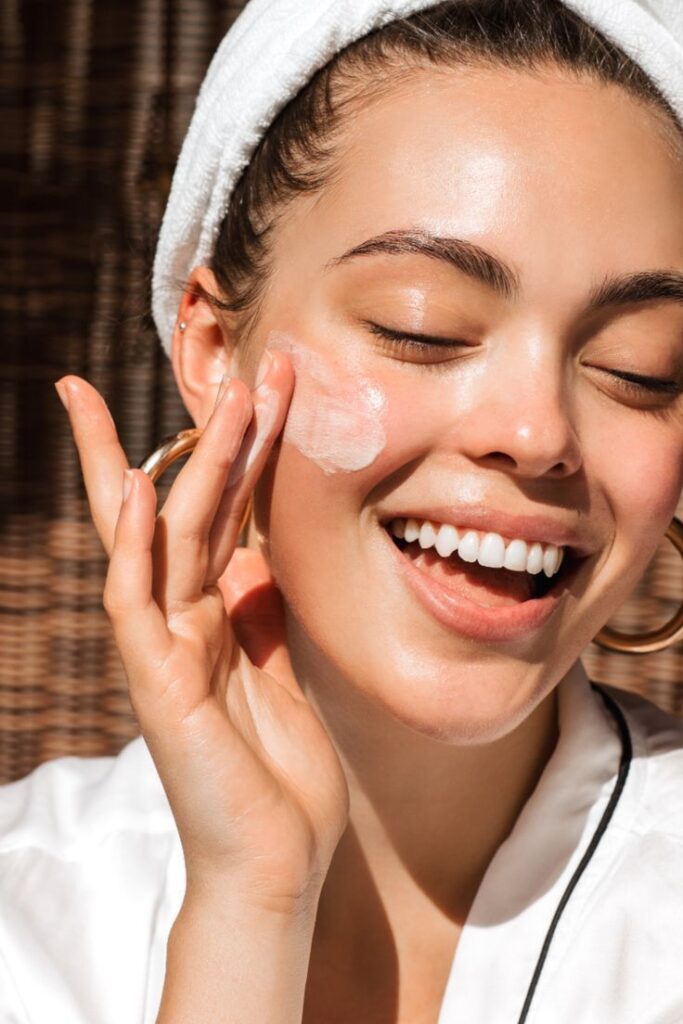
During the winter, the cold air, low humidity, and indoor heating can severely dehydrate the skin, leaving it dry, flaky, and sensitive. This is why winter skincare should emphasize moisture retention, barrier protection, and soothing ingredients.
Key Tips for Winter Skincare:
- Gentle, Hydrating Cleanser:
- Why: In winter, the skin’s natural moisture barrier is more vulnerable, and harsh cleansers can strip away essential oils, exacerbating dryness.
- How: Use a creamy or oil-based cleanser to maintain moisture levels while cleansing the skin without irritation.
- Example: Look for cleansers with hydrating ingredients like glycerin, honey, or oils such as jojoba or argan oil.
- Hydrating Toner (Optional):
- Why: A hydrating toner can balance the skin’s pH, remove any remaining impurities, and replenish moisture after cleansing.
- How: Choose an alcohol-free toner that contains soothing, hydrating ingredients like aloe vera, rose water, or glycerin.
- Example: Avoid toners with alcohol or astringents that can dry out your skin further.
- Heavy Moisturizer:
- Why: Moisturizing is essential in winter as the skin loses moisture more quickly in cold air. A rich moisturizer will provide the necessary hydration and create a barrier against the cold.
- How: Opt for a thick, cream-based moisturizer containing emollients like shea butter, ceramides, and fatty acids to lock in moisture.
- Example: Look for moisturizers with ingredients like ceramides or hyaluronic acid to keep skin hydrated.
- Sun Protection:
- Why: Even in winter, UV rays can damage the skin and lead to premature aging and sunburns, particularly in snowy environments where sunlight can reflect off the snow.
- How: Apply a broad-spectrum sunscreen with at least SPF 30 every morning, even on cloudy days.
- Example: Use a moisturizing sunscreen with SPF to protect your skin while keeping it hydrated.
- Exfoliate Less Frequently:
- Why: While exfoliation can help remove dead skin cells, over-exfoliating in winter can lead to further dryness and sensitivity.
- How: Use a gentle chemical exfoliant (AHA or BHA) 1–2 times a week to promote skin renewal.
- Example: Avoid harsh physical scrubs that may irritate dry, sensitive skin.
- Use a Humidifier:
- Why: Indoor heating systems in winter can dry out the air and your skin. A humidifier can help maintain humidity in your living space, reducing the risk of dehydration.
- How: Keep a humidifier in your bedroom or living area to maintain moisture in the air and keep your skin from becoming excessively dry.

Summer Skincare: Focus on Oil Control and Sun Protection
Summer brings heat, humidity, and intense UV exposure. The skin can become oilier due to sweat and increased sebum production, and exposure to the sun can lead to premature aging, dark spots, and sunburn. Therefore, summer skincare should emphasize oil control, hydration without heaviness, and strong sun protection.
Key Tips for Summer Skincare:
- Lightweight Cleanser:
- Why: The warmer temperatures lead to more sweat and oil production, which can clog pores and contribute to breakouts.
- How: Use a gel-based or foaming cleanser to remove excess oil, dirt, and sweat without stripping your skin’s moisture.
- Example: Look for cleansers with ingredients like salicylic acid or tea tree oil to help combat oil and breakouts.
- Oil-Free or Gel-Based Moisturizer:
- Why: While your skin may still need hydration in the summer, a rich, heavy moisturizer may feel too greasy.
- How: Opt for lightweight, oil-free moisturizers that provide hydration without making the skin feel oily or heavy.
- Example: Moisturizers with ingredients like hyaluronic acid, aloe vera, or glycerin are great for summer, as they hydrate without clogging pores.
- Exfoliate More Frequently:
- Why: Dead skin cells, sweat, and sunscreen can build up and clog pores during the summer, leading to breakouts and dull skin.
- How: Exfoliate 2–3 times a week using a gentle chemical exfoliant (AHA/BHA) to keep your skin clear and glowing.
- Example: Salicylic acid is a great choice for preventing clogged pores and acne.
- Sun Protection (SPF 50+):
- Why: Summer exposes the skin to stronger UV rays, which can cause sunburn, premature aging, and skin cancer.
- How: Use a broad-spectrum sunscreen with SPF 30 or higher every morning and reapply every 2 hours if you’re outdoors.
- Example: Opt for a lightweight, non-comedogenic sunscreen that won’t clog pores, especially if you have oily or acne-prone skin.
- Cooling and Soothing Products:
- Why: Heat, humidity, and sun exposure can irritate the skin, making it prone to redness and inflammation.
- How: Use soothing after-sun products like aloe vera gel, cooling face mists, or hydrating serums to calm the skin.
- Example: Aloe vera gel, cucumber extracts, and chamomile are great options for soothing the skin.
- Stay Hydrated:
- Why: In summer, sweating and heat can lead to dehydration, affecting the skin’s appearance and elasticity.
- How: Drink plenty of water and use hydrating facial mists throughout the day to keep skin refreshed.
- Example: Consider carrying a facial mist with ingredients like aloe or rose water for a cooling, hydrating effect.
Conclusion
Adapting your skincare routine for the changing seasons is key to maintaining healthy, glowing skin year-round. In winter, prioritize hydration and protection against the cold, while in summer, focus on oil control, sun protection, and lightweight hydration. By tweaking your skincare routine to meet the needs of each season, you can ensure your skin remains balanced and radiant throughout the year.